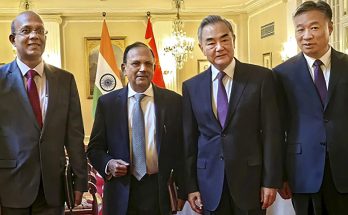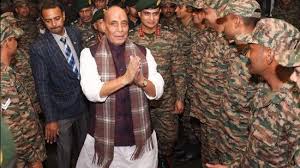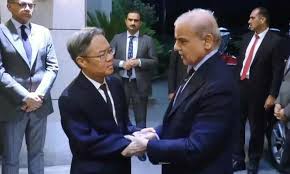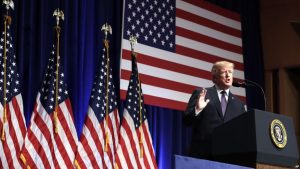 In US President Donald Trump’s newly-unveiled National Security Strategy (NSS), India is toasted as a leading global power, with Washington flaunting its love for New Delhi and deepening strategic and economic ties with this emerging power. Russia and China are painted as rivals and the US’ top national security threats, which threaten to “challenge American power, influence, and interests, attempting to erode American security and prosperity.”
In US President Donald Trump’s newly-unveiled National Security Strategy (NSS), India is toasted as a leading global power, with Washington flaunting its love for New Delhi and deepening strategic and economic ties with this emerging power. Russia and China are painted as rivals and the US’ top national security threats, which threaten to “challenge American power, influence, and interests, attempting to erode American security and prosperity.”If there is one country which has come out shining in Trump’s “America First” NSS, unveiled in Washington on December 18, it’s India, the world’s most populous democracy and the fastest growing major economy. Seeking to bolster India’s rise, the NSS also backs India’s concerns obliquely on the China-led One Belt One Road project and asks Pakistan to take “decisive action” against terror groups operating from its territory.
Clearly, there is a lot to rejoice for India, but the prospects of adversarial relations with Russia and China presage a conflicted international geopolitical landscape which New Delhi will have to tread cautiously.
US bats for India’s leadership role

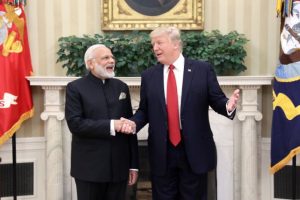
Going by the NSS, and the AfPak policy unveiled by Trump a few months ago, India is the US’ preferred partner in the global arena, which in Washington’s calculation will promote America’s larger strategic design.
“We welcome India’s emergence as a leading global power and stronger strategic and defence partner,” said the 2017 NSS. “We will expand our defence and security cooperation with India, a Major Defence Partner of the United States, and support India’s growing relationships throughout the region,” the NSS said.
“We will deepen our strategic partnership with India and support its leadership role in Indian Ocean security and throughout the broader region,” according to the NSS.
“We welcome India’s emergence as a leading global power and stronger strategic and defence partner,” said the 2017 NSS. “We will expand our defence and security cooperation with India, a Major Defence Partner of the United States, and support India’s growing relationships throughout the region,” the NSS said.
“We will deepen our strategic partnership with India and support its leadership role in Indian Ocean security and throughout the broader region,” according to the NSS.
Message to Pakistan: It’s time to act
India’s diplomatic-strategic establishment is set to applaud Washington’s renewed reminder to Islamabad to intensify its counter-terrorism efforts. The message from NSS to Pakistan is stern: It’s time to walk the talk on terror since no partnership can survive a country’s support for militants and terrorists who target a partner’s own service members and officials.
“We will insist that Pakistan take decisive action against militant and terrorist groups operating from its soil,” it said.
“We seek an American presence in the region proportionate to threats to the homeland and our allies. We seek a Pakistan that is not engaged in destabilising behaviour and a stable and self-reliant Afghanistan,” the NSS said.
India should also welcome Trump’s exhortation to Pakistan “to continue demonstrating that it is a responsible steward of its nuclear assets,” but should be a little wary of Washington’s apprehensions about “an Indo-Pakistani military conflict” leading to “a nuclear exchange,” as Islamabad may exploit to seek American interventionism in the Kashmir dispute.
The US interests in the region, according to NSS, include countering terrorist threats that impact the security of the US homeland and its allies, preventing cross-border terrorism that raises the prospect of military and nuclear tensions, and preventing nuclear weapons, technology, and materials from falling into the hands of terrorists.
“We will insist that Pakistan take decisive action against militant and terrorist groups operating from its soil,” it said.
“We seek an American presence in the region proportionate to threats to the homeland and our allies. We seek a Pakistan that is not engaged in destabilising behaviour and a stable and self-reliant Afghanistan,” the NSS said.
India should also welcome Trump’s exhortation to Pakistan “to continue demonstrating that it is a responsible steward of its nuclear assets,” but should be a little wary of Washington’s apprehensions about “an Indo-Pakistani military conflict” leading to “a nuclear exchange,” as Islamabad may exploit to seek American interventionism in the Kashmir dispute.
The US interests in the region, according to NSS, include countering terrorist threats that impact the security of the US homeland and its allies, preventing cross-border terrorism that raises the prospect of military and nuclear tensions, and preventing nuclear weapons, technology, and materials from falling into the hands of terrorists.
Checkmating China

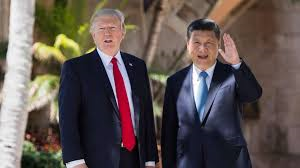
Against the backdrop of China’s expanding footprints in the South Asian countries, the NSS has underlined that the US “will help South Asian nations maintain their sovereignty as China increases its influence in the region”. This is seen as an expression of the US’ unease with the OBOR and China’s attempt to acquire preponderant influence in Sri Lanka and the Maldives, which are deeply resented by New Delhi.
Quad games & India’s balancing act
The NSS formulation hints at a calibrated China containment strategy in which India is being enlisted as a proactive partner. Shaping a balanced regional order and curbing China’s assertiveness align with New Delhi’s larger strategic goals, but given its own delicate relationship with China and extensive economic ties New Delhi will have to do a delicate diplomatic juggling act to avoid the impression of joining the US-led China containment design, which has been reinforced by the launch of the Quadrilateral dialogue among leading maritime democracies of the region, including India, US, Japan and Australia. The NSS gives the game away as it stresses that the US will seek to increase quadrilateral cooperation with Japan, Australia, and India.
(Manish Chand is Editor-in-Chief of India and World, a pioneering magazine focused on global affairs, and India Writes Network, www.indiawrites.org)
(Manish Chand is Editor-in-Chief of India and World, a pioneering magazine focused on global affairs, and India Writes Network, www.indiawrites.org)
Author Profile

- Manish Chand is Founder-CEO and Editor-in-Chief of India Writes Network (www.indiawrites.org) and India and World, a pioneering magazine focused on international affairs. He is CEO/Director of TGII Media Private Limited, an India-based media, publishing, research and consultancy company.
Latest entries
 India and the WorldApril 21, 20253T Template for India-US Mega Partnership
India and the WorldApril 21, 20253T Template for India-US Mega Partnership India and the WorldFebruary 14, 2025Modi-Trump COMPACT: India, US launch MEGA partnership for 21st century
India and the WorldFebruary 14, 2025Modi-Trump COMPACT: India, US launch MEGA partnership for 21st century India and the WorldJanuary 28, 2025Modi, Trump talk global peace, focus on strategic connect
India and the WorldJanuary 28, 2025Modi, Trump talk global peace, focus on strategic connect India and the WorldDecember 16, 2024Kazan Spirit: India, China SRs to hold talks in Beijing
India and the WorldDecember 16, 2024Kazan Spirit: India, China SRs to hold talks in Beijing





